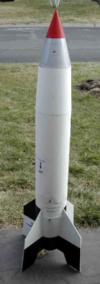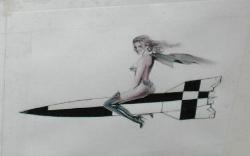| Manufacturer: | Scratch |
Son of the Grand Whazoo
 Brief
Brief
This update provides a description of how I rebuilt my Grand Whazoo after its
second fateful flight. The top of the original Grand Whazoo was *completely*
destroyed. However, the rear section, including the boat tail and fins, was
intact. I decided to take a different approach to the rebuild. To minimize the
volume that had to be pressurized, I decided to use an inner 4" diameter
tube extending through the body. After some pondering, I also decided to
eliminate the large nose cone in favor of a smaller one that would mate to this
4" tube. I was hoping this design would still stay within the 3.3 lb.
limit.
Reconstruction
I first performed some surgery, adapting a 4" mailing tube to the
surviving tail section. I then added foam rings and poster board to form the
body (including transitions). I made the small (4") conical nose cone from
fiberglassed poster board salvaged from the original rocket. A small foam board
ring and a chunk of 32mm tubing completed the nose cone assembly. This assembly
mates with the dowel/eyebolt from the original nose cone.
On my old scale, the finished rocket weighed in at 51oz with a G80 installed. The 60" chute that I used with the original Grand Whazoo pushed the weight over 3.3 lb. limit. To use this chute or a smaller one? Ahh, that is the question..

 Finishing
Finishing
I wanted a bit more decoration on this version so I decided on a pattern
similar to a real V2. I looked in ROTW and came up with a hybrid marking
scheme. The tail section has a black and white roll pattern, the nose cone is
red, and the transition section directly below the nose is painted silver
(Krylon hammered silver). Since most of the rocket is poster material, I
decided to mark the fins using a large permanent black marker. Finally, I added
some text and graphics from my ink jet printer. Inspired by the early V2's
fired from White Sands, I created a 'cheesecake' style graphic of a girl riding
a V2. And, in a feeble attempt at humor, I also added two labels written in
German. One identifies the bar code sticker, which unintentionally remained on
the body (oops), and the other tells the launch technician where to install the
launch rail.
Launch
Since the rocket was potentially over the 3.3 lb. limit, I took it to an HPR
launch, with the intent of using the 60" chute. Well, at the last minute,
I opted for a very light 48" chute, hoping it would come in under 3.3 lb,
and recover without significant damage. Well, on the highly calibrated scale at
the RSO table, it weighted in at 3 lb. even. It can also fly at the NARHAMS
V2-themed launch later this year!
Once again, everyone was surprised that this big a rocket weighs so little, and there were cheers when it boosted under G80 power. The 4-second delay was just a tad long but the chute deployed nicely. The decent was still fairly slow, and the only 'damage' was a crease in one fin. No rework required.
Conclusion
Using an inner 4" stuffer tube with the smaller nose cone seems to be the
way to go. It was easier to construct, and I think recovery should be more
reliable (100% true based on a statistical sample of one :-) ). I'm glad it is
still classified as a large model rocket!
Sponsored Ads
 |
 |











